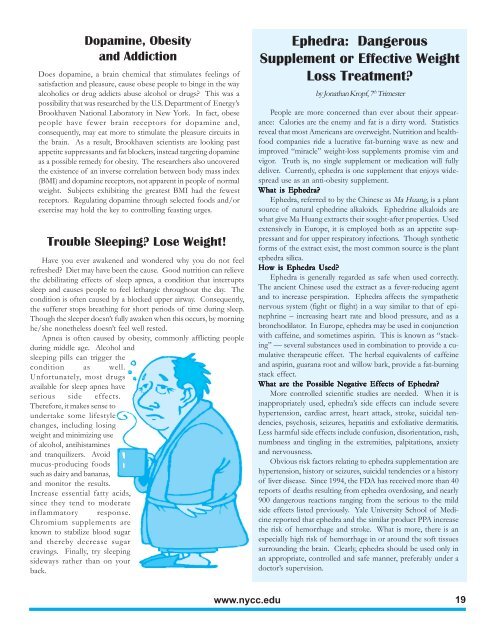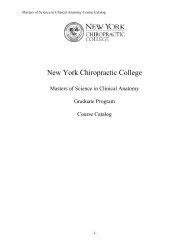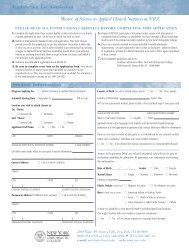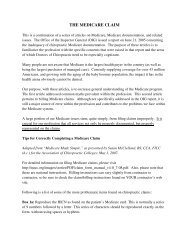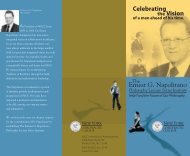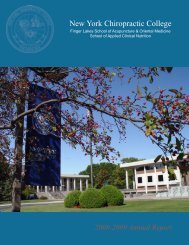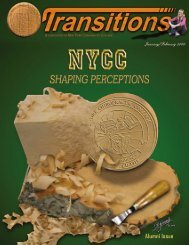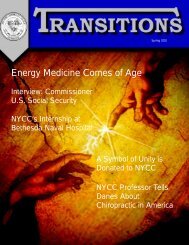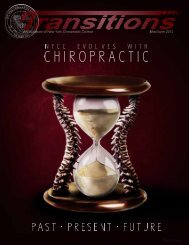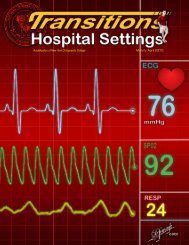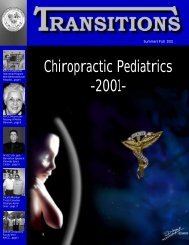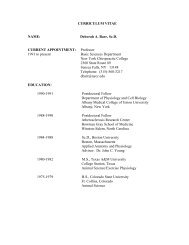2502 NYCC TRANS FINAL2 - New York Chiropractic College
2502 NYCC TRANS FINAL2 - New York Chiropractic College
2502 NYCC TRANS FINAL2 - New York Chiropractic College
You also want an ePaper? Increase the reach of your titles
YUMPU automatically turns print PDFs into web optimized ePapers that Google loves.
Dopamine, Obesity<br />
and Addiction<br />
Does dopamine, a brain chemical that stimulates feelings of<br />
satisfaction and pleasure, cause obese people to binge in the way<br />
alcoholics or drug addicts abuse alcohol or drugs? This was a<br />
possibility that was researched by the U.S. Department of Energy’s<br />
Brookhaven National Laboratory in <strong>New</strong> <strong>York</strong>. In fact, obese<br />
people have fewer brain receptors for dopamine and,<br />
consequently, may eat more to stimulate the pleasure circuits in<br />
the brain. As a result, Brookhaven scientists are looking past<br />
appetite suppressants and fat blockers, instead targeting dopamine<br />
as a possible remedy for obesity. The researchers also uncovered<br />
the existence of an inverse correlation between body mass index<br />
(BMI) and dopamine receptors, not apparent in people of normal<br />
weight. Subjects exhibiting the greatest BMI had the fewest<br />
receptors. Regulating dopamine through selected foods and/or<br />
exercise may hold the key to controlling feasting urges.<br />
Trouble Sleeping? Lose Weight!<br />
Have you ever awakened and wondered why you do not feel<br />
refreshed? Diet may have been the cause. Good nutrition can relieve<br />
the debilitating effects of sleep apnea, a condition that interrupts<br />
sleep and causes people to feel lethargic throughout the day. The<br />
condition is often caused by a blocked upper airway. Consequently,<br />
the sufferer stops breathing for short periods of time during sleep.<br />
Though the sleeper doesn’t fully awaken when this occurs, by morning<br />
he/she nonetheless doesn’t feel well rested.<br />
Apnea is often caused by obesity, commonly afflicting people<br />
during middle age. Alcohol and<br />
sleeping pills can trigger the<br />
condition as well.<br />
Unfortunately, most drugs<br />
available for sleep apnea have<br />
serious side effects.<br />
Therefore, it makes sense to<br />
undertake some lifestyle<br />
changes, including losing<br />
weight and minimizing use<br />
of alcohol, antihistamines<br />
and tranquilizers. Avoid<br />
mucus-producing foods<br />
such as dairy and bananas,<br />
and monitor the results.<br />
Increase essential fatty acids,<br />
since they tend to moderate<br />
inflammatory response.<br />
Chromium supplements are<br />
known to stabilize blood sugar<br />
and thereby decrease sugar<br />
cravings. Finally, try sleeping<br />
sideways rather than on your<br />
back.<br />
Ephedra: Dangerous<br />
Supplement or Effective Weight<br />
Loss Treatment?<br />
by Jonathan Kropf, 7 th Trimester<br />
People are more concerned than ever about their appearance:<br />
Calories are the enemy and fat is a dirty word. Statistics<br />
reveal that most Americans are overweight. Nutrition and healthfood<br />
companies ride a lucrative fat-burning wave as new and<br />
improved “miracle” weight-loss supplements promise vim and<br />
vigor. Truth is, no single supplement or medication will fully<br />
deliver. Currently, ephedra is one supplement that enjoys widespread<br />
use as an anti-obesity supplement.<br />
What is Ephedra?<br />
Ephedra, referred to by the Chinese as Ma Huang, is a plant<br />
source of natural ephedrine alkaloids. Ephedrine alkaloids are<br />
what give Ma Huang extracts their sought-after properties. Used<br />
extensively in Europe, it is employed both as an appetite suppressant<br />
and for upper respiratory infections. Though synthetic<br />
forms of the extract exist, the most common source is the plant<br />
ephedra silica.<br />
How is Ephedra Used?<br />
Ephedra is generally regarded as safe when used correctly.<br />
The ancient Chinese used the extract as a fever-reducing agent<br />
and to increase perspiration. Ephedra affects the sympathetic<br />
nervous system (fight or flight) in a way similar to that of epinephrine<br />
– increasing heart rate and blood pressure, and as a<br />
bronchodilator. In Europe, ephedra may be used in conjunction<br />
with caffeine, and sometimes aspirin. This is known as “stacking”<br />
— several substances used in combination to provide a cumulative<br />
therapeutic effect. The herbal equivalents of caffeine<br />
and aspirin, guarana root and willow bark, provide a fat-burning<br />
stack effect.<br />
What are the Possible Negative Effects of Ephedra?<br />
More controlled scientific studies are needed. When it is<br />
inappropriately used, ephedra’s side effects can include severe<br />
hypertension, cardiac arrest, heart attack, stroke, suicidal tendencies,<br />
psychosis, seizures, hepatitis and exfoliative dermatitis.<br />
Less harmful side effects include confusion, disorientation, rash,<br />
numbness and tingling in the extremities, palpitations, anxiety<br />
and nervousness.<br />
Obvious risk factors relating to ephedra supplementation are<br />
hypertension, history or seizures, suicidal tendencies or a history<br />
of liver disease. Since 1994, the FDA has received more than 40<br />
reports of deaths resulting from ephedra overdosing, and nearly<br />
900 dangerous reactions ranging from the serious to the mild<br />
side effects listed previously. Yale University School of Medicine<br />
reported that ephedra and the similar product PPA increase<br />
the risk of hemorrhage and stroke. What is more, there is an<br />
especially high risk of hemorrhage in or around the soft tissues<br />
surrounding the brain. Clearly, ephedra should be used only in<br />
an appropriate, controlled and safe manner, preferably under a<br />
doctor’s supervision.<br />
www.nycc.edu<br />
19


